Answer to Question 7 7 Economics Motives One to Write a Paper
VerifiedAdded on 2022/10/17
|13
|2939
|326
AI Summary
MICROECONOMICS MICROECONOMICS MICROECONOMICS 11 11 Microeconomics Name of the Student Name of the Author Author note Answer to Question 1 2 Answer to Question 2 2 Answer to Question 3 3 Answer to Question 4 4 Answer to Question 5 5 Answer to Question 6 5 Answer to Question 7 7 Answer to Question 8 8 References 10 Answer to Question 1 Economics incentives motivates one to fulfill their preferences in form of desires, wants and needs (Liu and Pycia 2016). Operation Barga
Contribute Materials
Your contribution can guide someone’s learning journey. Share your
documents today.
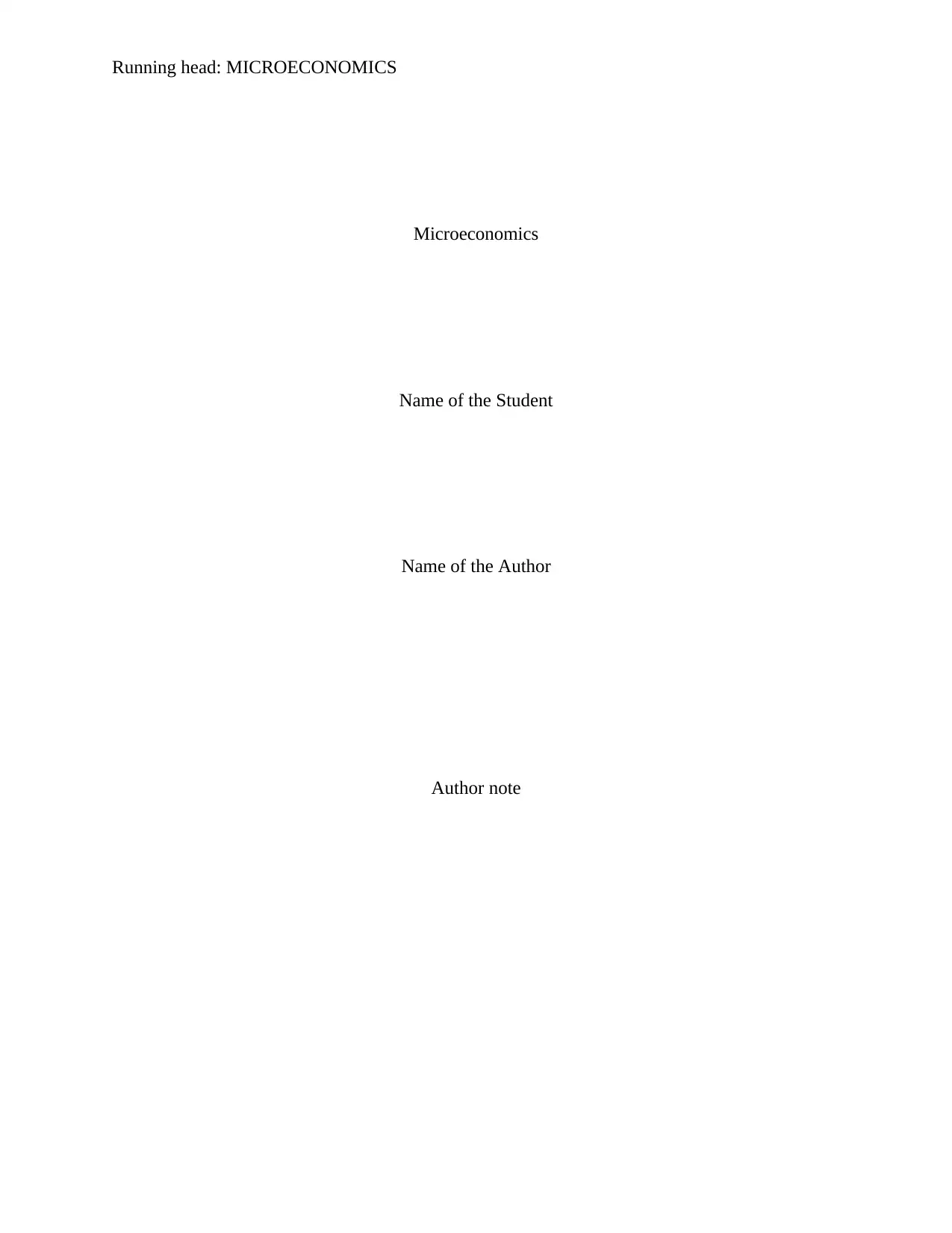
Running head: MICROECONOMICS
Microeconomics
Name of the Student
Name of the Author
Author note
Microeconomics
Name of the Student
Name of the Author
Author note
Secure Best Marks with AI Grader
Need help grading? Try our AI Grader for instant feedback on your assignments.
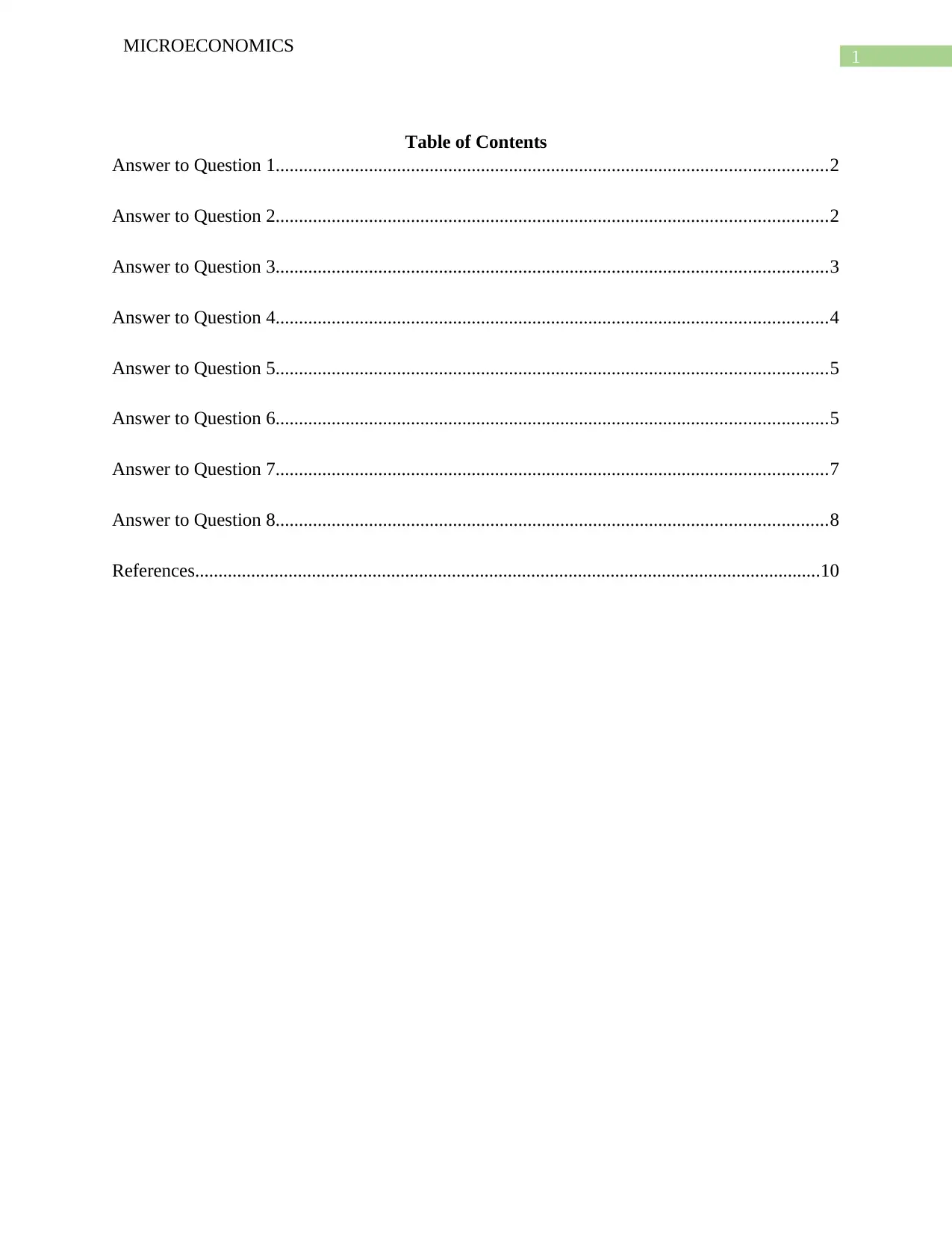
1
MICROECONOMICS
Table of Contents
Answer to Question 1......................................................................................................................2
Answer to Question 2......................................................................................................................2
Answer to Question 3......................................................................................................................3
Answer to Question 4......................................................................................................................4
Answer to Question 5......................................................................................................................5
Answer to Question 6......................................................................................................................5
Answer to Question 7......................................................................................................................7
Answer to Question 8......................................................................................................................8
References......................................................................................................................................10
MICROECONOMICS
Table of Contents
Answer to Question 1......................................................................................................................2
Answer to Question 2......................................................................................................................2
Answer to Question 3......................................................................................................................3
Answer to Question 4......................................................................................................................4
Answer to Question 5......................................................................................................................5
Answer to Question 6......................................................................................................................5
Answer to Question 7......................................................................................................................7
Answer to Question 8......................................................................................................................8
References......................................................................................................................................10
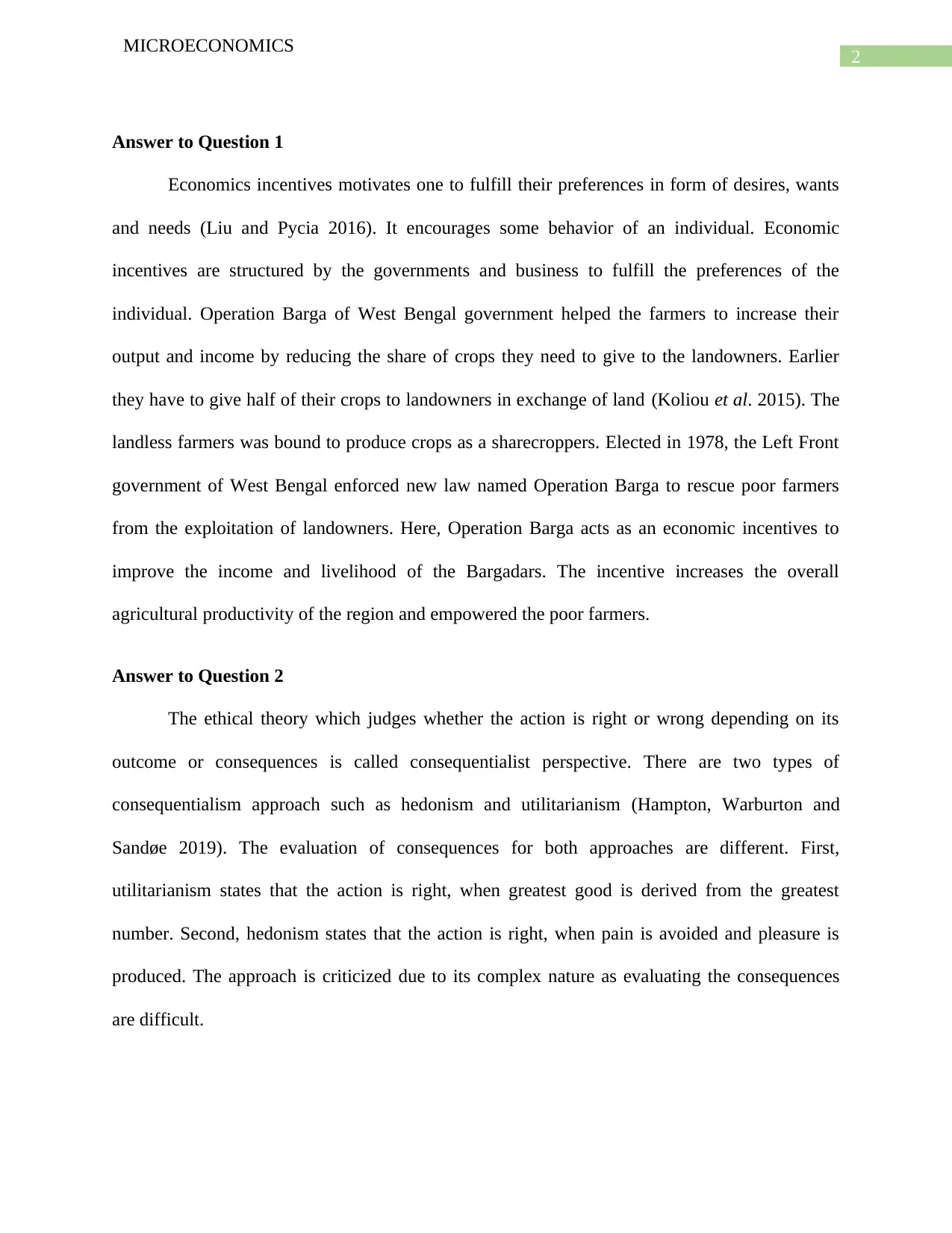
2
MICROECONOMICS
Answer to Question 1
Economics incentives motivates one to fulfill their preferences in form of desires, wants
and needs (Liu and Pycia 2016). It encourages some behavior of an individual. Economic
incentives are structured by the governments and business to fulfill the preferences of the
individual. Operation Barga of West Bengal government helped the farmers to increase their
output and income by reducing the share of crops they need to give to the landowners. Earlier
they have to give half of their crops to landowners in exchange of land (Koliou et al. 2015). The
landless farmers was bound to produce crops as a sharecroppers. Elected in 1978, the Left Front
government of West Bengal enforced new law named Operation Barga to rescue poor farmers
from the exploitation of landowners. Here, Operation Barga acts as an economic incentives to
improve the income and livelihood of the Bargadars. The incentive increases the overall
agricultural productivity of the region and empowered the poor farmers.
Answer to Question 2
The ethical theory which judges whether the action is right or wrong depending on its
outcome or consequences is called consequentialist perspective. There are two types of
consequentialism approach such as hedonism and utilitarianism (Hampton, Warburton and
Sandøe 2019). The evaluation of consequences for both approaches are different. First,
utilitarianism states that the action is right, when greatest good is derived from the greatest
number. Second, hedonism states that the action is right, when pain is avoided and pleasure is
produced. The approach is criticized due to its complex nature as evaluating the consequences
are difficult.
MICROECONOMICS
Answer to Question 1
Economics incentives motivates one to fulfill their preferences in form of desires, wants
and needs (Liu and Pycia 2016). It encourages some behavior of an individual. Economic
incentives are structured by the governments and business to fulfill the preferences of the
individual. Operation Barga of West Bengal government helped the farmers to increase their
output and income by reducing the share of crops they need to give to the landowners. Earlier
they have to give half of their crops to landowners in exchange of land (Koliou et al. 2015). The
landless farmers was bound to produce crops as a sharecroppers. Elected in 1978, the Left Front
government of West Bengal enforced new law named Operation Barga to rescue poor farmers
from the exploitation of landowners. Here, Operation Barga acts as an economic incentives to
improve the income and livelihood of the Bargadars. The incentive increases the overall
agricultural productivity of the region and empowered the poor farmers.
Answer to Question 2
The ethical theory which judges whether the action is right or wrong depending on its
outcome or consequences is called consequentialist perspective. There are two types of
consequentialism approach such as hedonism and utilitarianism (Hampton, Warburton and
Sandøe 2019). The evaluation of consequences for both approaches are different. First,
utilitarianism states that the action is right, when greatest good is derived from the greatest
number. Second, hedonism states that the action is right, when pain is avoided and pleasure is
produced. The approach is criticized due to its complex nature as evaluating the consequences
are difficult.
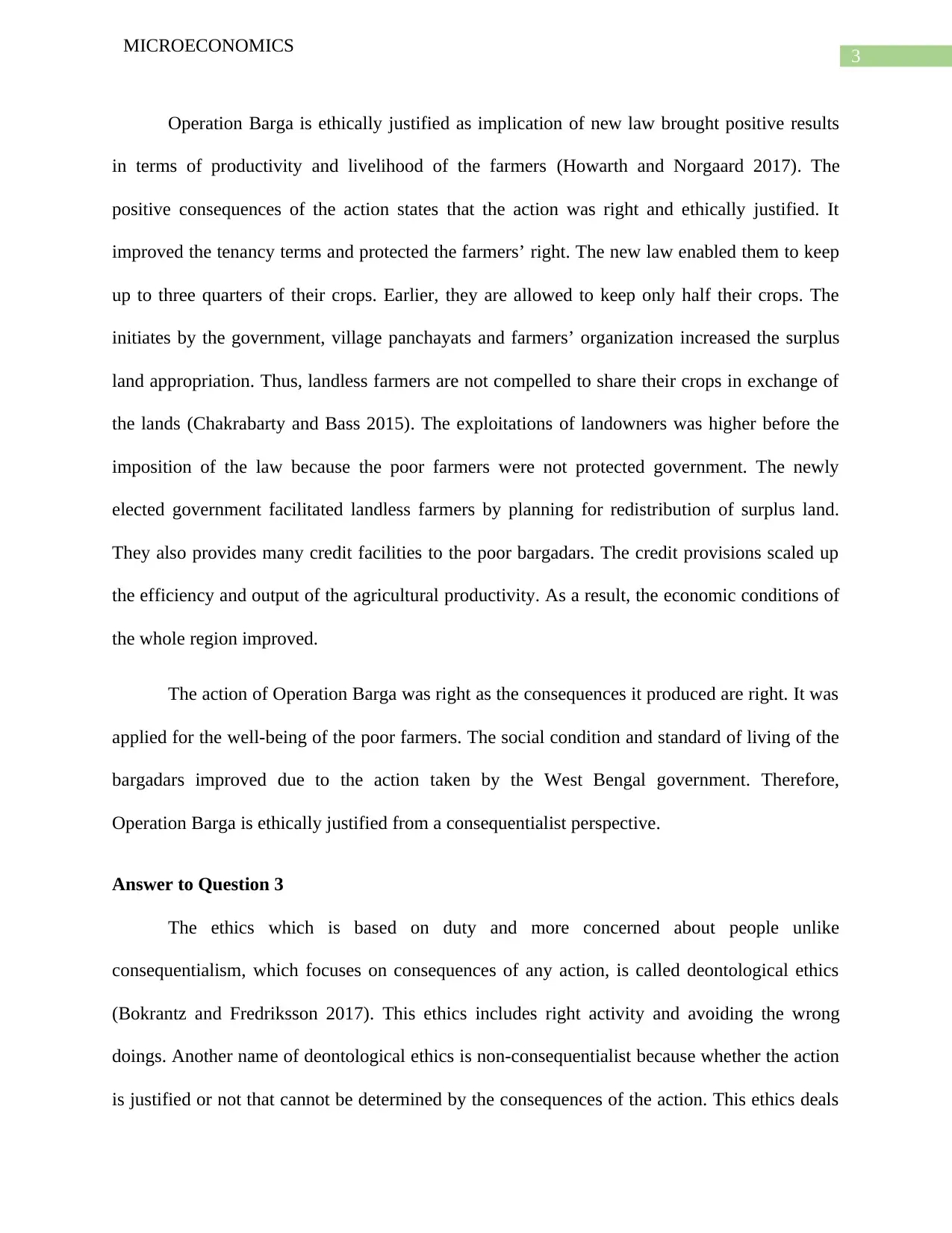
3
MICROECONOMICS
Operation Barga is ethically justified as implication of new law brought positive results
in terms of productivity and livelihood of the farmers (Howarth and Norgaard 2017). The
positive consequences of the action states that the action was right and ethically justified. It
improved the tenancy terms and protected the farmers’ right. The new law enabled them to keep
up to three quarters of their crops. Earlier, they are allowed to keep only half their crops. The
initiates by the government, village panchayats and farmers’ organization increased the surplus
land appropriation. Thus, landless farmers are not compelled to share their crops in exchange of
the lands (Chakrabarty and Bass 2015). The exploitations of landowners was higher before the
imposition of the law because the poor farmers were not protected government. The newly
elected government facilitated landless farmers by planning for redistribution of surplus land.
They also provides many credit facilities to the poor bargadars. The credit provisions scaled up
the efficiency and output of the agricultural productivity. As a result, the economic conditions of
the whole region improved.
The action of Operation Barga was right as the consequences it produced are right. It was
applied for the well-being of the poor farmers. The social condition and standard of living of the
bargadars improved due to the action taken by the West Bengal government. Therefore,
Operation Barga is ethically justified from a consequentialist perspective.
Answer to Question 3
The ethics which is based on duty and more concerned about people unlike
consequentialism, which focuses on consequences of any action, is called deontological ethics
(Bokrantz and Fredriksson 2017). This ethics includes right activity and avoiding the wrong
doings. Another name of deontological ethics is non-consequentialist because whether the action
is justified or not that cannot be determined by the consequences of the action. This ethics deals
MICROECONOMICS
Operation Barga is ethically justified as implication of new law brought positive results
in terms of productivity and livelihood of the farmers (Howarth and Norgaard 2017). The
positive consequences of the action states that the action was right and ethically justified. It
improved the tenancy terms and protected the farmers’ right. The new law enabled them to keep
up to three quarters of their crops. Earlier, they are allowed to keep only half their crops. The
initiates by the government, village panchayats and farmers’ organization increased the surplus
land appropriation. Thus, landless farmers are not compelled to share their crops in exchange of
the lands (Chakrabarty and Bass 2015). The exploitations of landowners was higher before the
imposition of the law because the poor farmers were not protected government. The newly
elected government facilitated landless farmers by planning for redistribution of surplus land.
They also provides many credit facilities to the poor bargadars. The credit provisions scaled up
the efficiency and output of the agricultural productivity. As a result, the economic conditions of
the whole region improved.
The action of Operation Barga was right as the consequences it produced are right. It was
applied for the well-being of the poor farmers. The social condition and standard of living of the
bargadars improved due to the action taken by the West Bengal government. Therefore,
Operation Barga is ethically justified from a consequentialist perspective.
Answer to Question 3
The ethics which is based on duty and more concerned about people unlike
consequentialism, which focuses on consequences of any action, is called deontological ethics
(Bokrantz and Fredriksson 2017). This ethics includes right activity and avoiding the wrong
doings. Another name of deontological ethics is non-consequentialist because whether the action
is justified or not that cannot be determined by the consequences of the action. This ethics deals
Secure Best Marks with AI Grader
Need help grading? Try our AI Grader for instant feedback on your assignments.
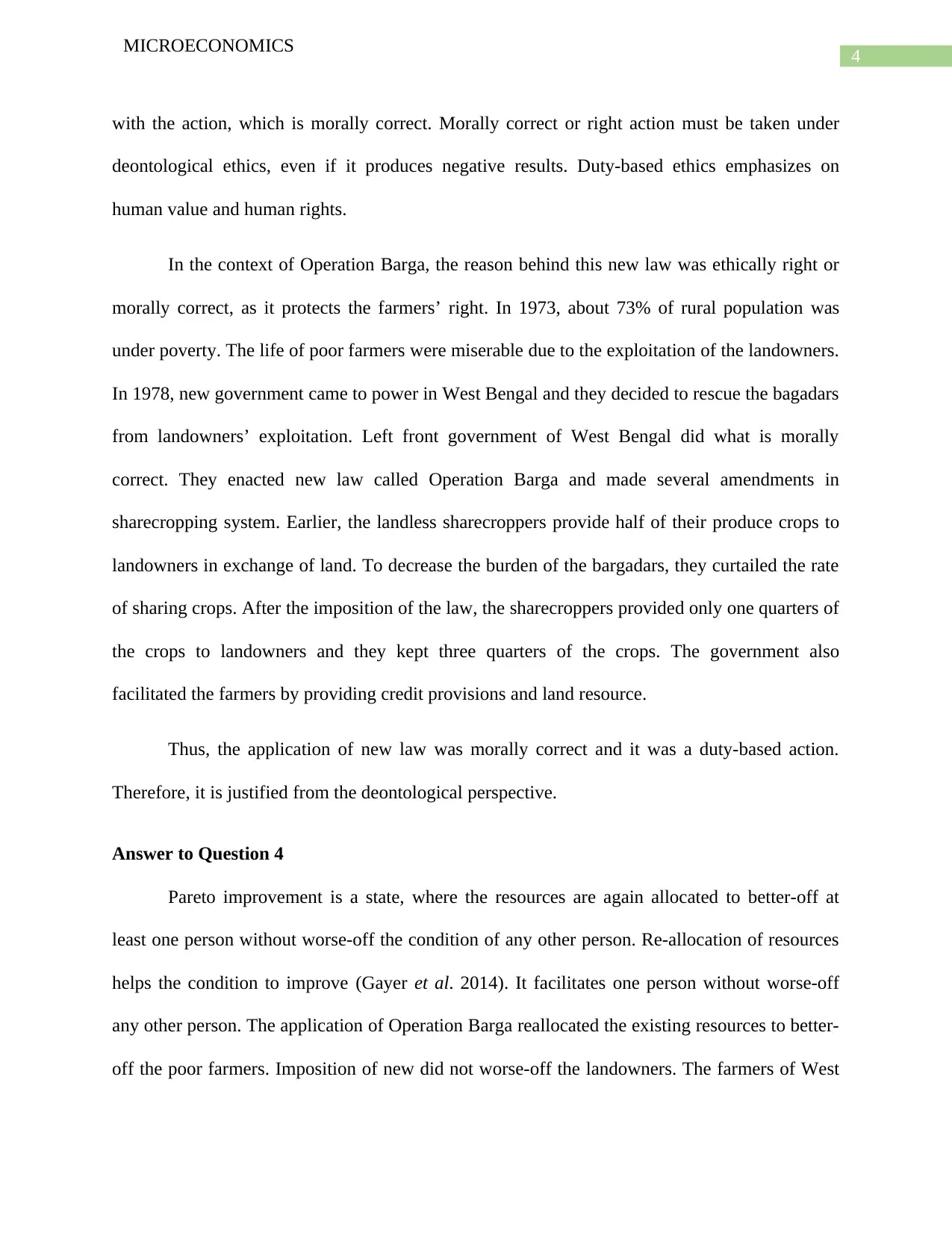
4
MICROECONOMICS
with the action, which is morally correct. Morally correct or right action must be taken under
deontological ethics, even if it produces negative results. Duty-based ethics emphasizes on
human value and human rights.
In the context of Operation Barga, the reason behind this new law was ethically right or
morally correct, as it protects the farmers’ right. In 1973, about 73% of rural population was
under poverty. The life of poor farmers were miserable due to the exploitation of the landowners.
In 1978, new government came to power in West Bengal and they decided to rescue the bagadars
from landowners’ exploitation. Left front government of West Bengal did what is morally
correct. They enacted new law called Operation Barga and made several amendments in
sharecropping system. Earlier, the landless sharecroppers provide half of their produce crops to
landowners in exchange of land. To decrease the burden of the bargadars, they curtailed the rate
of sharing crops. After the imposition of the law, the sharecroppers provided only one quarters of
the crops to landowners and they kept three quarters of the crops. The government also
facilitated the farmers by providing credit provisions and land resource.
Thus, the application of new law was morally correct and it was a duty-based action.
Therefore, it is justified from the deontological perspective.
Answer to Question 4
Pareto improvement is a state, where the resources are again allocated to better-off at
least one person without worse-off the condition of any other person. Re-allocation of resources
helps the condition to improve (Gayer et al. 2014). It facilitates one person without worse-off
any other person. The application of Operation Barga reallocated the existing resources to better-
off the poor farmers. Imposition of new did not worse-off the landowners. The farmers of West
MICROECONOMICS
with the action, which is morally correct. Morally correct or right action must be taken under
deontological ethics, even if it produces negative results. Duty-based ethics emphasizes on
human value and human rights.
In the context of Operation Barga, the reason behind this new law was ethically right or
morally correct, as it protects the farmers’ right. In 1973, about 73% of rural population was
under poverty. The life of poor farmers were miserable due to the exploitation of the landowners.
In 1978, new government came to power in West Bengal and they decided to rescue the bagadars
from landowners’ exploitation. Left front government of West Bengal did what is morally
correct. They enacted new law called Operation Barga and made several amendments in
sharecropping system. Earlier, the landless sharecroppers provide half of their produce crops to
landowners in exchange of land. To decrease the burden of the bargadars, they curtailed the rate
of sharing crops. After the imposition of the law, the sharecroppers provided only one quarters of
the crops to landowners and they kept three quarters of the crops. The government also
facilitated the farmers by providing credit provisions and land resource.
Thus, the application of new law was morally correct and it was a duty-based action.
Therefore, it is justified from the deontological perspective.
Answer to Question 4
Pareto improvement is a state, where the resources are again allocated to better-off at
least one person without worse-off the condition of any other person. Re-allocation of resources
helps the condition to improve (Gayer et al. 2014). It facilitates one person without worse-off
any other person. The application of Operation Barga reallocated the existing resources to better-
off the poor farmers. Imposition of new did not worse-off the landowners. The farmers of West
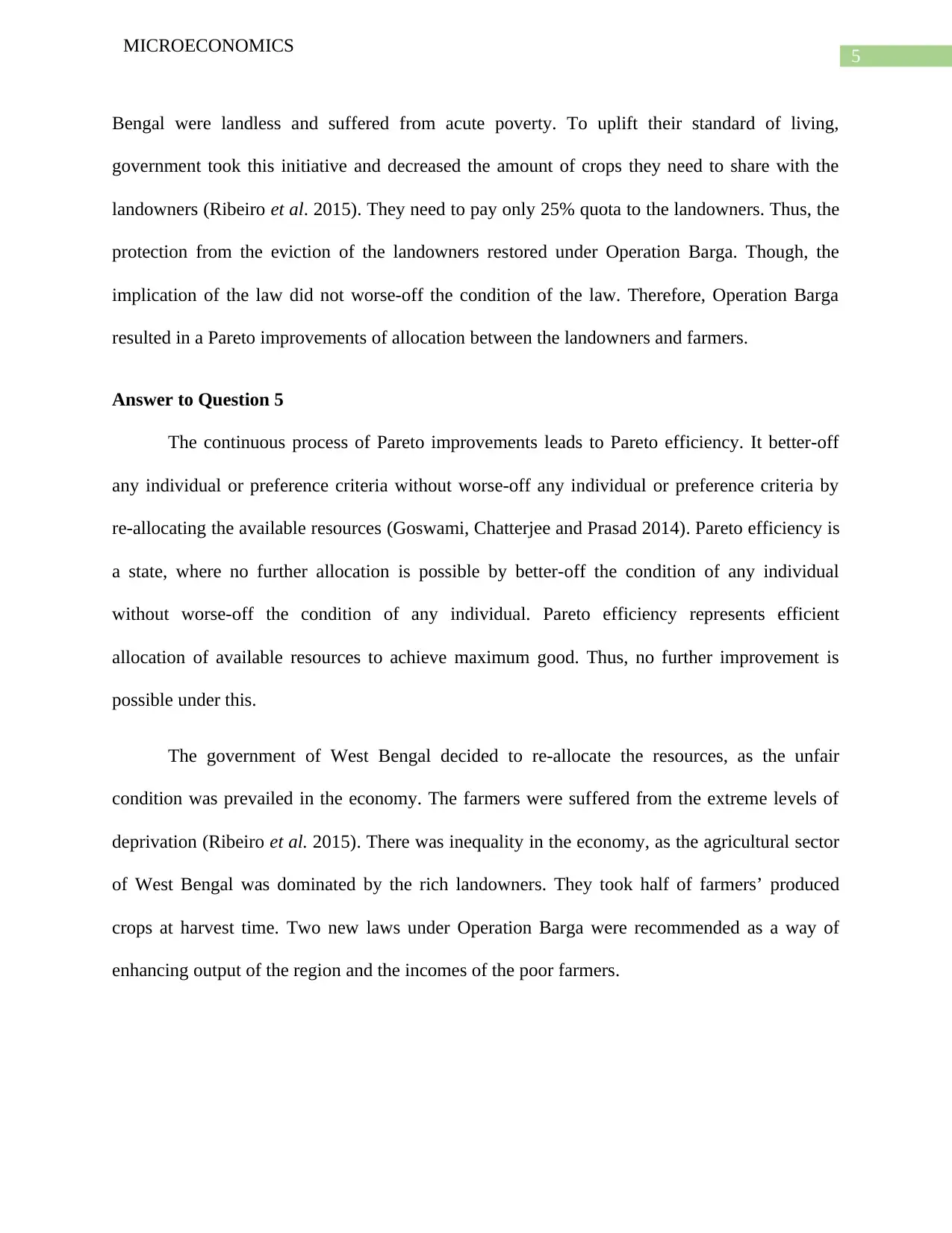
5
MICROECONOMICS
Bengal were landless and suffered from acute poverty. To uplift their standard of living,
government took this initiative and decreased the amount of crops they need to share with the
landowners (Ribeiro et al. 2015). They need to pay only 25% quota to the landowners. Thus, the
protection from the eviction of the landowners restored under Operation Barga. Though, the
implication of the law did not worse-off the condition of the law. Therefore, Operation Barga
resulted in a Pareto improvements of allocation between the landowners and farmers.
Answer to Question 5
The continuous process of Pareto improvements leads to Pareto efficiency. It better-off
any individual or preference criteria without worse-off any individual or preference criteria by
re-allocating the available resources (Goswami, Chatterjee and Prasad 2014). Pareto efficiency is
a state, where no further allocation is possible by better-off the condition of any individual
without worse-off the condition of any individual. Pareto efficiency represents efficient
allocation of available resources to achieve maximum good. Thus, no further improvement is
possible under this.
The government of West Bengal decided to re-allocate the resources, as the unfair
condition was prevailed in the economy. The farmers were suffered from the extreme levels of
deprivation (Ribeiro et al. 2015). There was inequality in the economy, as the agricultural sector
of West Bengal was dominated by the rich landowners. They took half of farmers’ produced
crops at harvest time. Two new laws under Operation Barga were recommended as a way of
enhancing output of the region and the incomes of the poor farmers.
MICROECONOMICS
Bengal were landless and suffered from acute poverty. To uplift their standard of living,
government took this initiative and decreased the amount of crops they need to share with the
landowners (Ribeiro et al. 2015). They need to pay only 25% quota to the landowners. Thus, the
protection from the eviction of the landowners restored under Operation Barga. Though, the
implication of the law did not worse-off the condition of the law. Therefore, Operation Barga
resulted in a Pareto improvements of allocation between the landowners and farmers.
Answer to Question 5
The continuous process of Pareto improvements leads to Pareto efficiency. It better-off
any individual or preference criteria without worse-off any individual or preference criteria by
re-allocating the available resources (Goswami, Chatterjee and Prasad 2014). Pareto efficiency is
a state, where no further allocation is possible by better-off the condition of any individual
without worse-off the condition of any individual. Pareto efficiency represents efficient
allocation of available resources to achieve maximum good. Thus, no further improvement is
possible under this.
The government of West Bengal decided to re-allocate the resources, as the unfair
condition was prevailed in the economy. The farmers were suffered from the extreme levels of
deprivation (Ribeiro et al. 2015). There was inequality in the economy, as the agricultural sector
of West Bengal was dominated by the rich landowners. They took half of farmers’ produced
crops at harvest time. Two new laws under Operation Barga were recommended as a way of
enhancing output of the region and the incomes of the poor farmers.
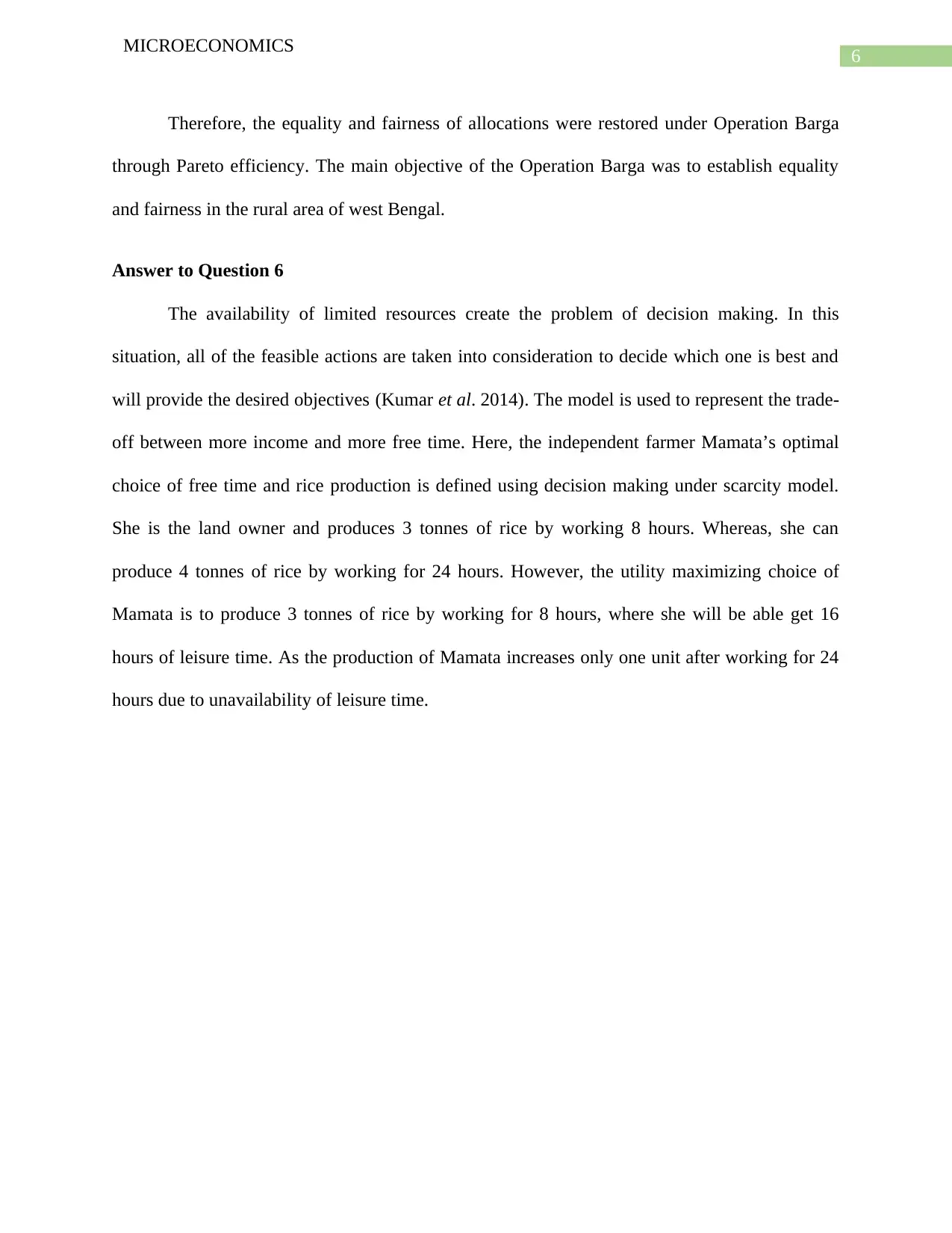
6
MICROECONOMICS
Therefore, the equality and fairness of allocations were restored under Operation Barga
through Pareto efficiency. The main objective of the Operation Barga was to establish equality
and fairness in the rural area of west Bengal.
Answer to Question 6
The availability of limited resources create the problem of decision making. In this
situation, all of the feasible actions are taken into consideration to decide which one is best and
will provide the desired objectives (Kumar et al. 2014). The model is used to represent the trade-
off between more income and more free time. Here, the independent farmer Mamata’s optimal
choice of free time and rice production is defined using decision making under scarcity model.
She is the land owner and produces 3 tonnes of rice by working 8 hours. Whereas, she can
produce 4 tonnes of rice by working for 24 hours. However, the utility maximizing choice of
Mamata is to produce 3 tonnes of rice by working for 8 hours, where she will be able get 16
hours of leisure time. As the production of Mamata increases only one unit after working for 24
hours due to unavailability of leisure time.
MICROECONOMICS
Therefore, the equality and fairness of allocations were restored under Operation Barga
through Pareto efficiency. The main objective of the Operation Barga was to establish equality
and fairness in the rural area of west Bengal.
Answer to Question 6
The availability of limited resources create the problem of decision making. In this
situation, all of the feasible actions are taken into consideration to decide which one is best and
will provide the desired objectives (Kumar et al. 2014). The model is used to represent the trade-
off between more income and more free time. Here, the independent farmer Mamata’s optimal
choice of free time and rice production is defined using decision making under scarcity model.
She is the land owner and produces 3 tonnes of rice by working 8 hours. Whereas, she can
produce 4 tonnes of rice by working for 24 hours. However, the utility maximizing choice of
Mamata is to produce 3 tonnes of rice by working for 8 hours, where she will be able get 16
hours of leisure time. As the production of Mamata increases only one unit after working for 24
hours due to unavailability of leisure time.
Paraphrase This Document
Need a fresh take? Get an instant paraphrase of this document with our AI Paraphraser
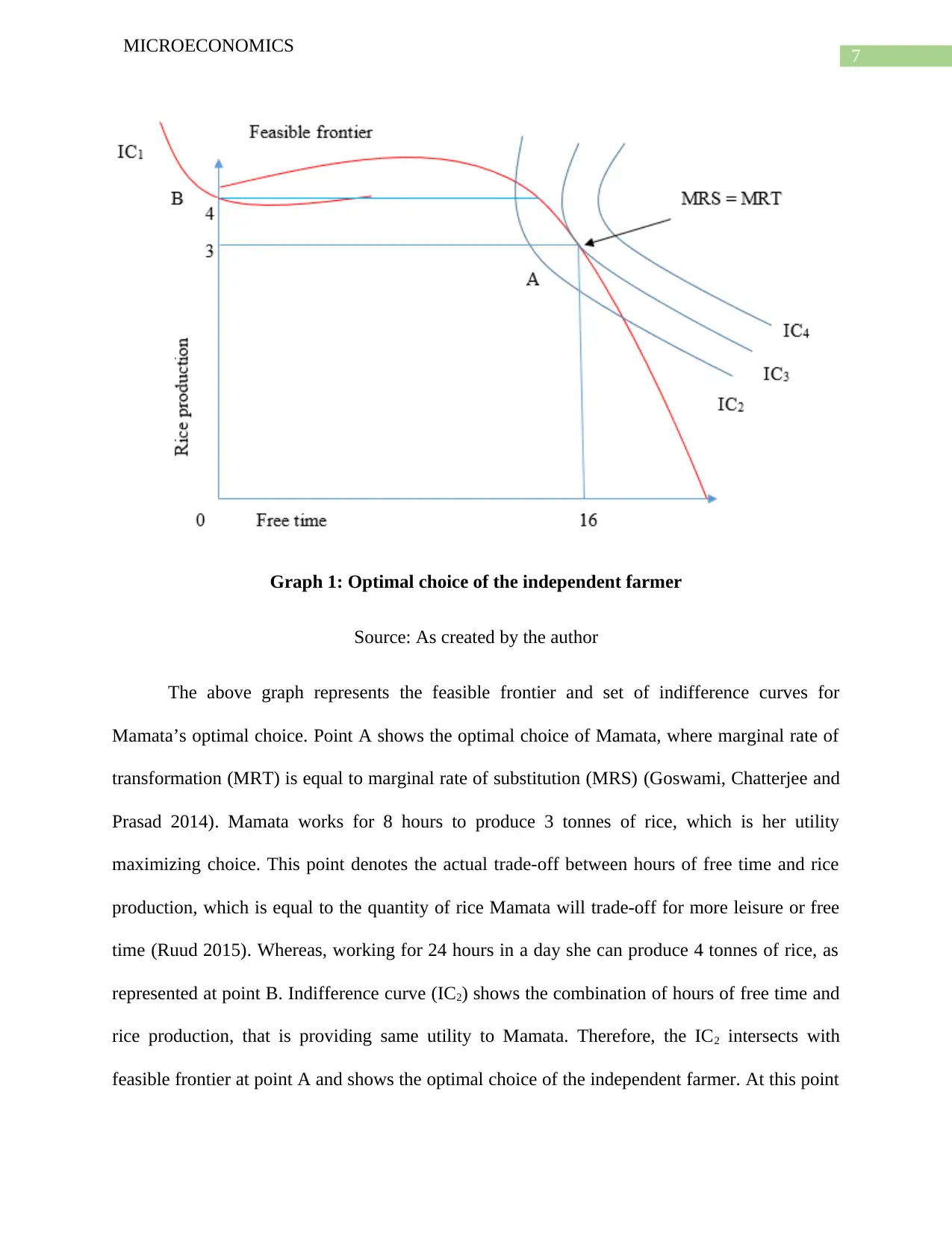
7
MICROECONOMICS
Graph 1: Optimal choice of the independent farmer
Source: As created by the author
The above graph represents the feasible frontier and set of indifference curves for
Mamata’s optimal choice. Point A shows the optimal choice of Mamata, where marginal rate of
transformation (MRT) is equal to marginal rate of substitution (MRS) (Goswami, Chatterjee and
Prasad 2014). Mamata works for 8 hours to produce 3 tonnes of rice, which is her utility
maximizing choice. This point denotes the actual trade-off between hours of free time and rice
production, which is equal to the quantity of rice Mamata will trade-off for more leisure or free
time (Ruud 2015). Whereas, working for 24 hours in a day she can produce 4 tonnes of rice, as
represented at point B. Indifference curve (IC2) shows the combination of hours of free time and
rice production, that is providing same utility to Mamata. Therefore, the IC2 intersects with
feasible frontier at point A and shows the optimal choice of the independent farmer. At this point
MICROECONOMICS
Graph 1: Optimal choice of the independent farmer
Source: As created by the author
The above graph represents the feasible frontier and set of indifference curves for
Mamata’s optimal choice. Point A shows the optimal choice of Mamata, where marginal rate of
transformation (MRT) is equal to marginal rate of substitution (MRS) (Goswami, Chatterjee and
Prasad 2014). Mamata works for 8 hours to produce 3 tonnes of rice, which is her utility
maximizing choice. This point denotes the actual trade-off between hours of free time and rice
production, which is equal to the quantity of rice Mamata will trade-off for more leisure or free
time (Ruud 2015). Whereas, working for 24 hours in a day she can produce 4 tonnes of rice, as
represented at point B. Indifference curve (IC2) shows the combination of hours of free time and
rice production, that is providing same utility to Mamata. Therefore, the IC2 intersects with
feasible frontier at point A and shows the optimal choice of the independent farmer. At this point
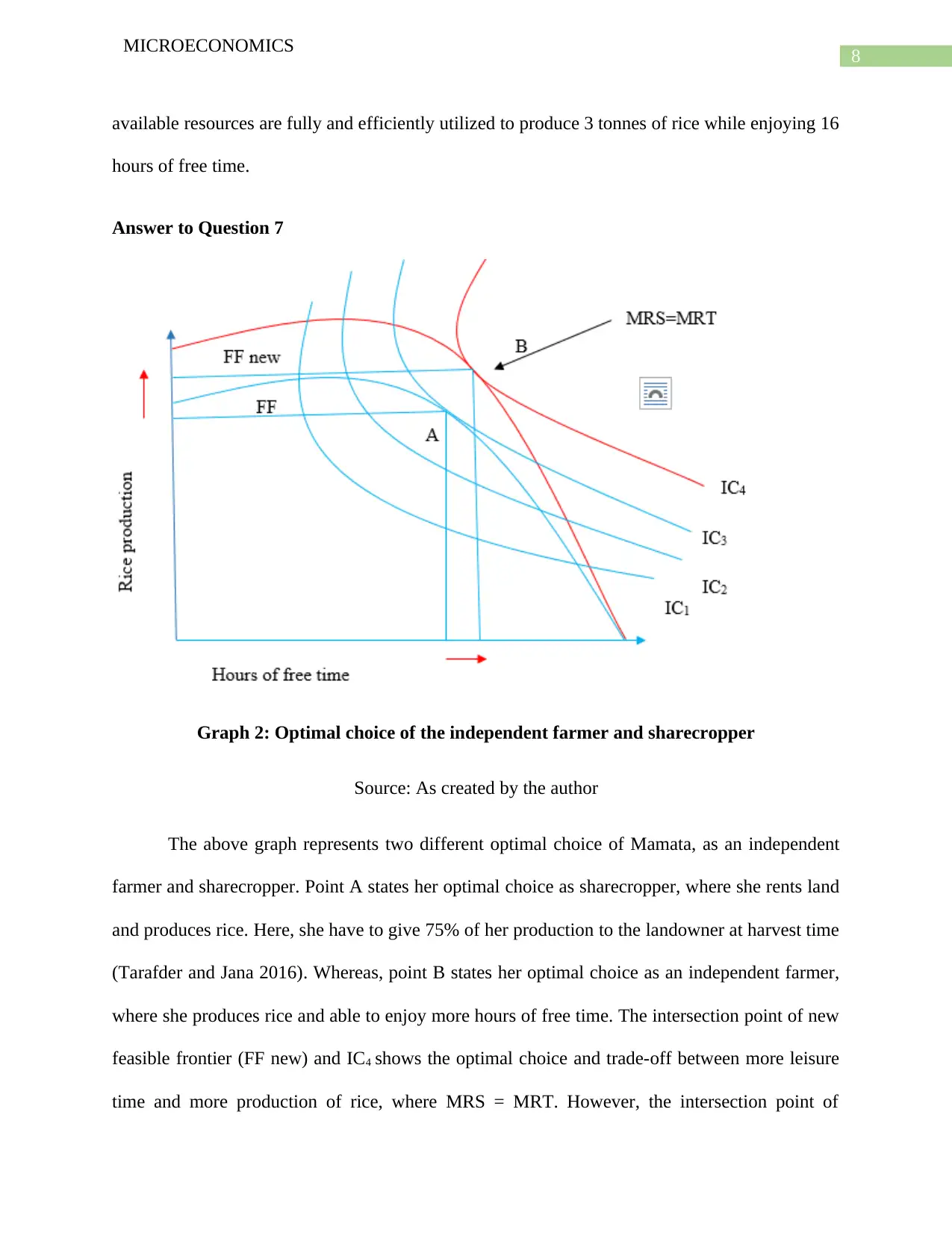
8
MICROECONOMICS
available resources are fully and efficiently utilized to produce 3 tonnes of rice while enjoying 16
hours of free time.
Answer to Question 7
Graph 2: Optimal choice of the independent farmer and sharecropper
Source: As created by the author
The above graph represents two different optimal choice of Mamata, as an independent
farmer and sharecropper. Point A states her optimal choice as sharecropper, where she rents land
and produces rice. Here, she have to give 75% of her production to the landowner at harvest time
(Tarafder and Jana 2016). Whereas, point B states her optimal choice as an independent farmer,
where she produces rice and able to enjoy more hours of free time. The intersection point of new
feasible frontier (FF new) and IC4 shows the optimal choice and trade-off between more leisure
time and more production of rice, where MRS = MRT. However, the intersection point of
MICROECONOMICS
available resources are fully and efficiently utilized to produce 3 tonnes of rice while enjoying 16
hours of free time.
Answer to Question 7
Graph 2: Optimal choice of the independent farmer and sharecropper
Source: As created by the author
The above graph represents two different optimal choice of Mamata, as an independent
farmer and sharecropper. Point A states her optimal choice as sharecropper, where she rents land
and produces rice. Here, she have to give 75% of her production to the landowner at harvest time
(Tarafder and Jana 2016). Whereas, point B states her optimal choice as an independent farmer,
where she produces rice and able to enjoy more hours of free time. The intersection point of new
feasible frontier (FF new) and IC4 shows the optimal choice and trade-off between more leisure
time and more production of rice, where MRS = MRT. However, the intersection point of
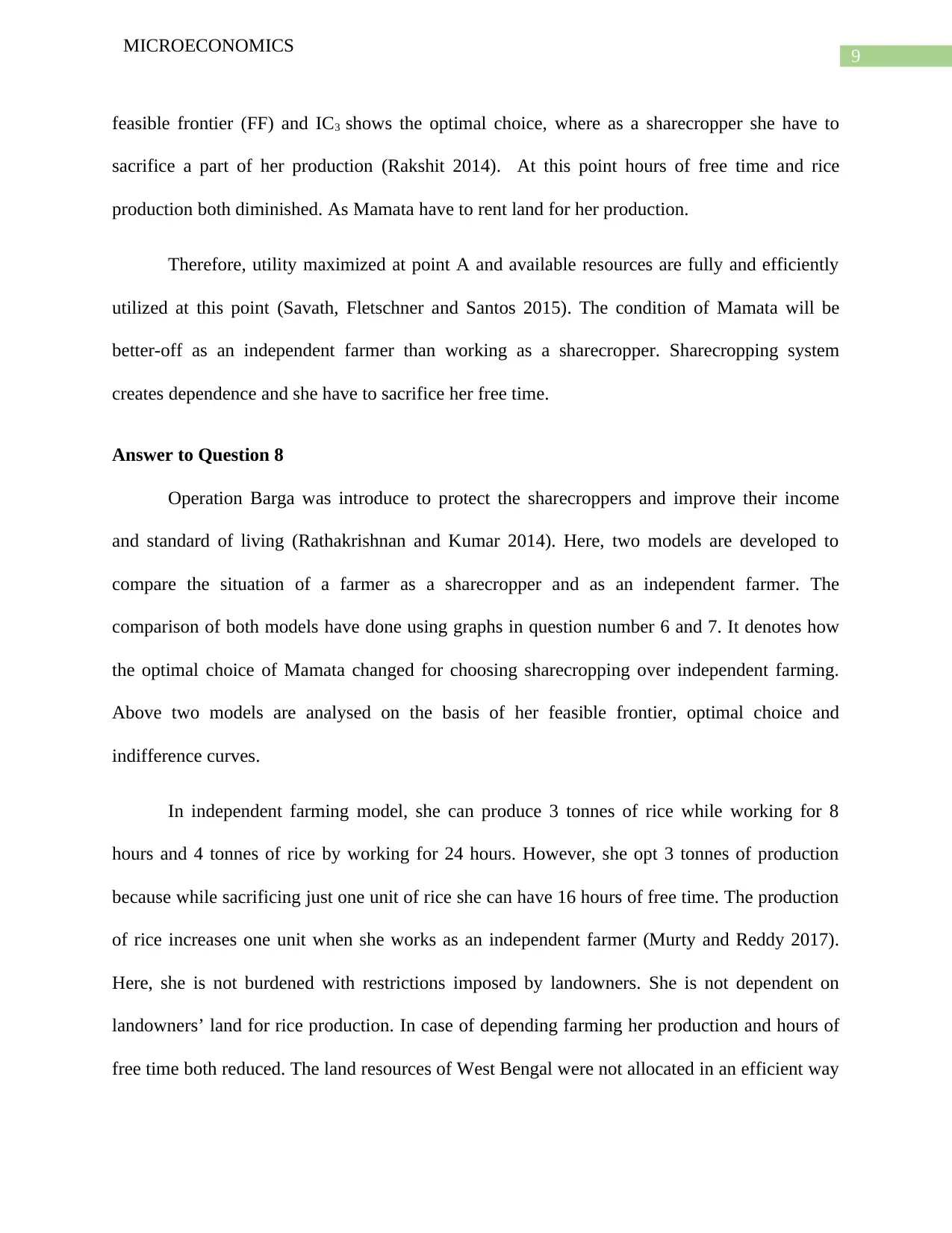
9
MICROECONOMICS
feasible frontier (FF) and IC3 shows the optimal choice, where as a sharecropper she have to
sacrifice a part of her production (Rakshit 2014). At this point hours of free time and rice
production both diminished. As Mamata have to rent land for her production.
Therefore, utility maximized at point A and available resources are fully and efficiently
utilized at this point (Savath, Fletschner and Santos 2015). The condition of Mamata will be
better-off as an independent farmer than working as a sharecropper. Sharecropping system
creates dependence and she have to sacrifice her free time.
Answer to Question 8
Operation Barga was introduce to protect the sharecroppers and improve their income
and standard of living (Rathakrishnan and Kumar 2014). Here, two models are developed to
compare the situation of a farmer as a sharecropper and as an independent farmer. The
comparison of both models have done using graphs in question number 6 and 7. It denotes how
the optimal choice of Mamata changed for choosing sharecropping over independent farming.
Above two models are analysed on the basis of her feasible frontier, optimal choice and
indifference curves.
In independent farming model, she can produce 3 tonnes of rice while working for 8
hours and 4 tonnes of rice by working for 24 hours. However, she opt 3 tonnes of production
because while sacrificing just one unit of rice she can have 16 hours of free time. The production
of rice increases one unit when she works as an independent farmer (Murty and Reddy 2017).
Here, she is not burdened with restrictions imposed by landowners. She is not dependent on
landowners’ land for rice production. In case of depending farming her production and hours of
free time both reduced. The land resources of West Bengal were not allocated in an efficient way
MICROECONOMICS
feasible frontier (FF) and IC3 shows the optimal choice, where as a sharecropper she have to
sacrifice a part of her production (Rakshit 2014). At this point hours of free time and rice
production both diminished. As Mamata have to rent land for her production.
Therefore, utility maximized at point A and available resources are fully and efficiently
utilized at this point (Savath, Fletschner and Santos 2015). The condition of Mamata will be
better-off as an independent farmer than working as a sharecropper. Sharecropping system
creates dependence and she have to sacrifice her free time.
Answer to Question 8
Operation Barga was introduce to protect the sharecroppers and improve their income
and standard of living (Rathakrishnan and Kumar 2014). Here, two models are developed to
compare the situation of a farmer as a sharecropper and as an independent farmer. The
comparison of both models have done using graphs in question number 6 and 7. It denotes how
the optimal choice of Mamata changed for choosing sharecropping over independent farming.
Above two models are analysed on the basis of her feasible frontier, optimal choice and
indifference curves.
In independent farming model, she can produce 3 tonnes of rice while working for 8
hours and 4 tonnes of rice by working for 24 hours. However, she opt 3 tonnes of production
because while sacrificing just one unit of rice she can have 16 hours of free time. The production
of rice increases one unit when she works as an independent farmer (Murty and Reddy 2017).
Here, she is not burdened with restrictions imposed by landowners. She is not dependent on
landowners’ land for rice production. In case of depending farming her production and hours of
free time both reduced. The land resources of West Bengal were not allocated in an efficient way
Secure Best Marks with AI Grader
Need help grading? Try our AI Grader for instant feedback on your assignments.
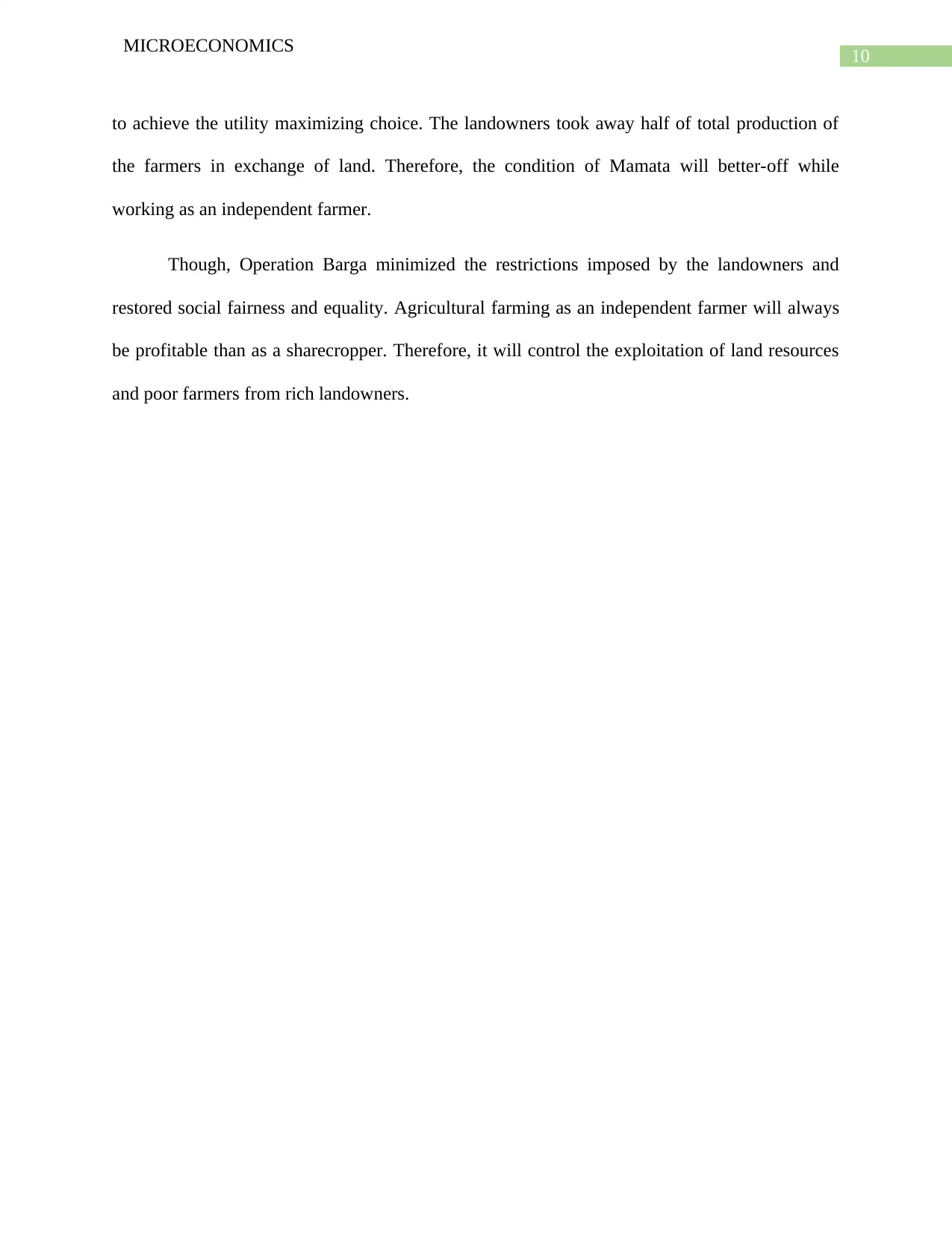
10
MICROECONOMICS
to achieve the utility maximizing choice. The landowners took away half of total production of
the farmers in exchange of land. Therefore, the condition of Mamata will better-off while
working as an independent farmer.
Though, Operation Barga minimized the restrictions imposed by the landowners and
restored social fairness and equality. Agricultural farming as an independent farmer will always
be profitable than as a sharecropper. Therefore, it will control the exploitation of land resources
and poor farmers from rich landowners.
MICROECONOMICS
to achieve the utility maximizing choice. The landowners took away half of total production of
the farmers in exchange of land. Therefore, the condition of Mamata will better-off while
working as an independent farmer.
Though, Operation Barga minimized the restrictions imposed by the landowners and
restored social fairness and equality. Agricultural farming as an independent farmer will always
be profitable than as a sharecropper. Therefore, it will control the exploitation of land resources
and poor farmers from rich landowners.
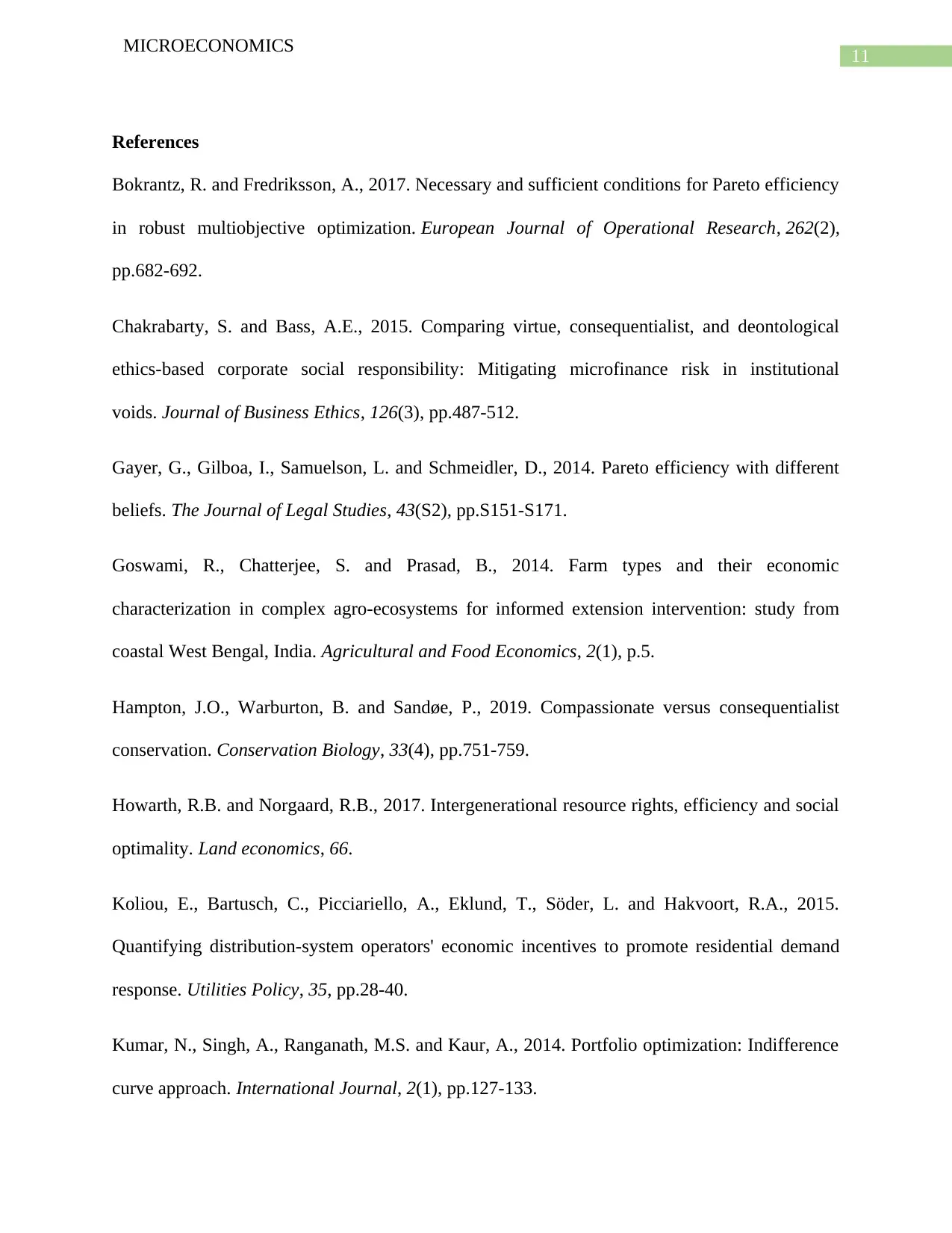
11
MICROECONOMICS
References
Bokrantz, R. and Fredriksson, A., 2017. Necessary and sufficient conditions for Pareto efficiency
in robust multiobjective optimization. European Journal of Operational Research, 262(2),
pp.682-692.
Chakrabarty, S. and Bass, A.E., 2015. Comparing virtue, consequentialist, and deontological
ethics-based corporate social responsibility: Mitigating microfinance risk in institutional
voids. Journal of Business Ethics, 126(3), pp.487-512.
Gayer, G., Gilboa, I., Samuelson, L. and Schmeidler, D., 2014. Pareto efficiency with different
beliefs. The Journal of Legal Studies, 43(S2), pp.S151-S171.
Goswami, R., Chatterjee, S. and Prasad, B., 2014. Farm types and their economic
characterization in complex agro-ecosystems for informed extension intervention: study from
coastal West Bengal, India. Agricultural and Food Economics, 2(1), p.5.
Hampton, J.O., Warburton, B. and Sandøe, P., 2019. Compassionate versus consequentialist
conservation. Conservation Biology, 33(4), pp.751-759.
Howarth, R.B. and Norgaard, R.B., 2017. Intergenerational resource rights, efficiency and social
optimality. Land economics, 66.
Koliou, E., Bartusch, C., Picciariello, A., Eklund, T., Söder, L. and Hakvoort, R.A., 2015.
Quantifying distribution-system operators' economic incentives to promote residential demand
response. Utilities Policy, 35, pp.28-40.
Kumar, N., Singh, A., Ranganath, M.S. and Kaur, A., 2014. Portfolio optimization: Indifference
curve approach. International Journal, 2(1), pp.127-133.
MICROECONOMICS
References
Bokrantz, R. and Fredriksson, A., 2017. Necessary and sufficient conditions for Pareto efficiency
in robust multiobjective optimization. European Journal of Operational Research, 262(2),
pp.682-692.
Chakrabarty, S. and Bass, A.E., 2015. Comparing virtue, consequentialist, and deontological
ethics-based corporate social responsibility: Mitigating microfinance risk in institutional
voids. Journal of Business Ethics, 126(3), pp.487-512.
Gayer, G., Gilboa, I., Samuelson, L. and Schmeidler, D., 2014. Pareto efficiency with different
beliefs. The Journal of Legal Studies, 43(S2), pp.S151-S171.
Goswami, R., Chatterjee, S. and Prasad, B., 2014. Farm types and their economic
characterization in complex agro-ecosystems for informed extension intervention: study from
coastal West Bengal, India. Agricultural and Food Economics, 2(1), p.5.
Hampton, J.O., Warburton, B. and Sandøe, P., 2019. Compassionate versus consequentialist
conservation. Conservation Biology, 33(4), pp.751-759.
Howarth, R.B. and Norgaard, R.B., 2017. Intergenerational resource rights, efficiency and social
optimality. Land economics, 66.
Koliou, E., Bartusch, C., Picciariello, A., Eklund, T., Söder, L. and Hakvoort, R.A., 2015.
Quantifying distribution-system operators' economic incentives to promote residential demand
response. Utilities Policy, 35, pp.28-40.
Kumar, N., Singh, A., Ranganath, M.S. and Kaur, A., 2014. Portfolio optimization: Indifference
curve approach. International Journal, 2(1), pp.127-133.
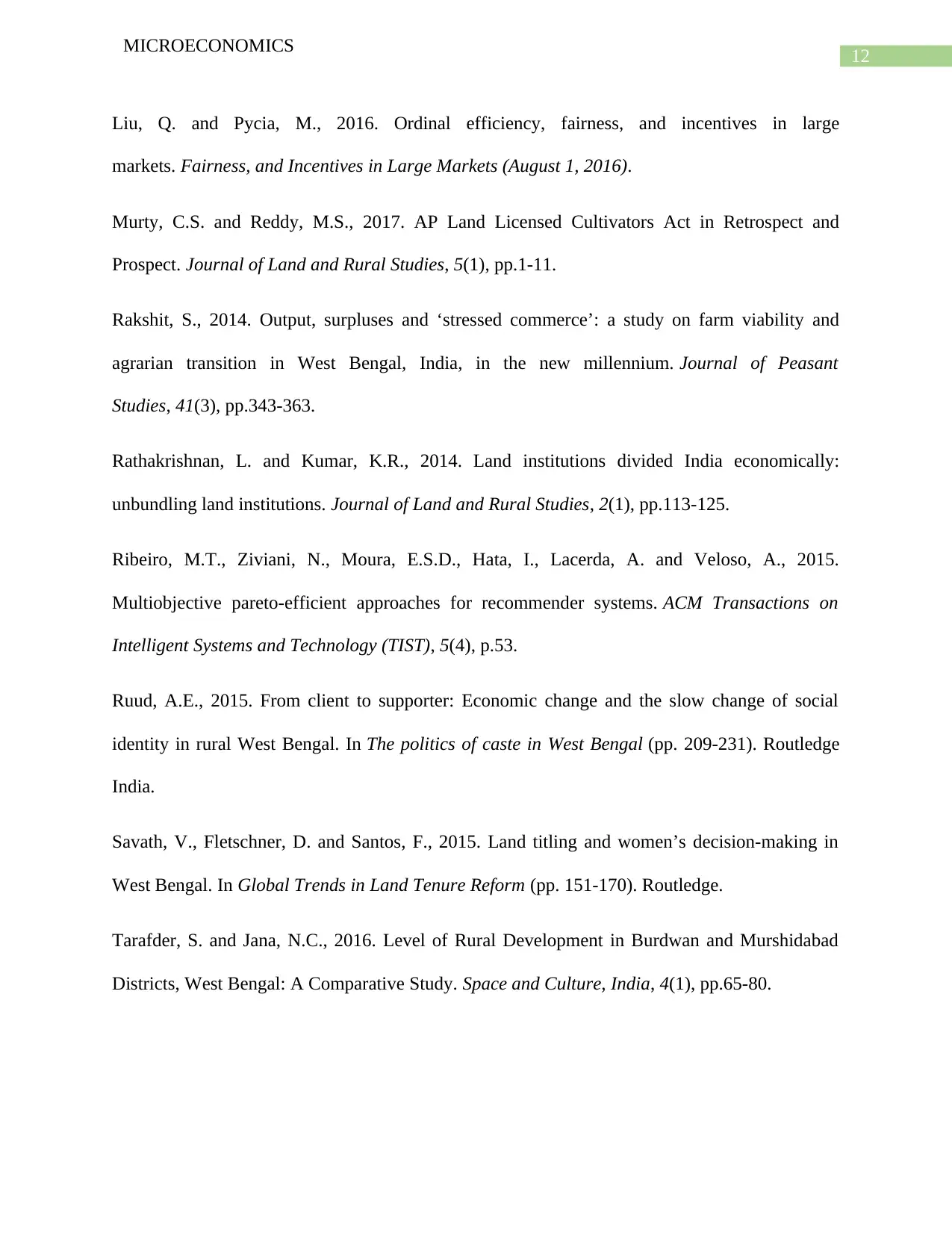
12
MICROECONOMICS
Liu, Q. and Pycia, M., 2016. Ordinal efficiency, fairness, and incentives in large
markets. Fairness, and Incentives in Large Markets (August 1, 2016).
Murty, C.S. and Reddy, M.S., 2017. AP Land Licensed Cultivators Act in Retrospect and
Prospect. Journal of Land and Rural Studies, 5(1), pp.1-11.
Rakshit, S., 2014. Output, surpluses and ‘stressed commerce’: a study on farm viability and
agrarian transition in West Bengal, India, in the new millennium. Journal of Peasant
Studies, 41(3), pp.343-363.
Rathakrishnan, L. and Kumar, K.R., 2014. Land institutions divided India economically:
unbundling land institutions. Journal of Land and Rural Studies, 2(1), pp.113-125.
Ribeiro, M.T., Ziviani, N., Moura, E.S.D., Hata, I., Lacerda, A. and Veloso, A., 2015.
Multiobjective pareto-efficient approaches for recommender systems. ACM Transactions on
Intelligent Systems and Technology (TIST), 5(4), p.53.
Ruud, A.E., 2015. From client to supporter: Economic change and the slow change of social
identity in rural West Bengal. In The politics of caste in West Bengal (pp. 209-231). Routledge
India.
Savath, V., Fletschner, D. and Santos, F., 2015. Land titling and women’s decision-making in
West Bengal. In Global Trends in Land Tenure Reform (pp. 151-170). Routledge.
Tarafder, S. and Jana, N.C., 2016. Level of Rural Development in Burdwan and Murshidabad
Districts, West Bengal: A Comparative Study. Space and Culture, India, 4(1), pp.65-80.
MICROECONOMICS
Liu, Q. and Pycia, M., 2016. Ordinal efficiency, fairness, and incentives in large
markets. Fairness, and Incentives in Large Markets (August 1, 2016).
Murty, C.S. and Reddy, M.S., 2017. AP Land Licensed Cultivators Act in Retrospect and
Prospect. Journal of Land and Rural Studies, 5(1), pp.1-11.
Rakshit, S., 2014. Output, surpluses and ‘stressed commerce’: a study on farm viability and
agrarian transition in West Bengal, India, in the new millennium. Journal of Peasant
Studies, 41(3), pp.343-363.
Rathakrishnan, L. and Kumar, K.R., 2014. Land institutions divided India economically:
unbundling land institutions. Journal of Land and Rural Studies, 2(1), pp.113-125.
Ribeiro, M.T., Ziviani, N., Moura, E.S.D., Hata, I., Lacerda, A. and Veloso, A., 2015.
Multiobjective pareto-efficient approaches for recommender systems. ACM Transactions on
Intelligent Systems and Technology (TIST), 5(4), p.53.
Ruud, A.E., 2015. From client to supporter: Economic change and the slow change of social
identity in rural West Bengal. In The politics of caste in West Bengal (pp. 209-231). Routledge
India.
Savath, V., Fletschner, D. and Santos, F., 2015. Land titling and women’s decision-making in
West Bengal. In Global Trends in Land Tenure Reform (pp. 151-170). Routledge.
Tarafder, S. and Jana, N.C., 2016. Level of Rural Development in Burdwan and Murshidabad
Districts, West Bengal: A Comparative Study. Space and Culture, India, 4(1), pp.65-80.
1 out of 13
Related Documents
Your All-in-One AI-Powered Toolkit for Academic Success.
+13062052269
info@desklib.com
Available 24*7 on WhatsApp / Email
![[object Object]](/_next/static/media/star-bottom.7253800d.svg)
Unlock your academic potential
© 2024 | Zucol Services PVT LTD | All rights reserved.





